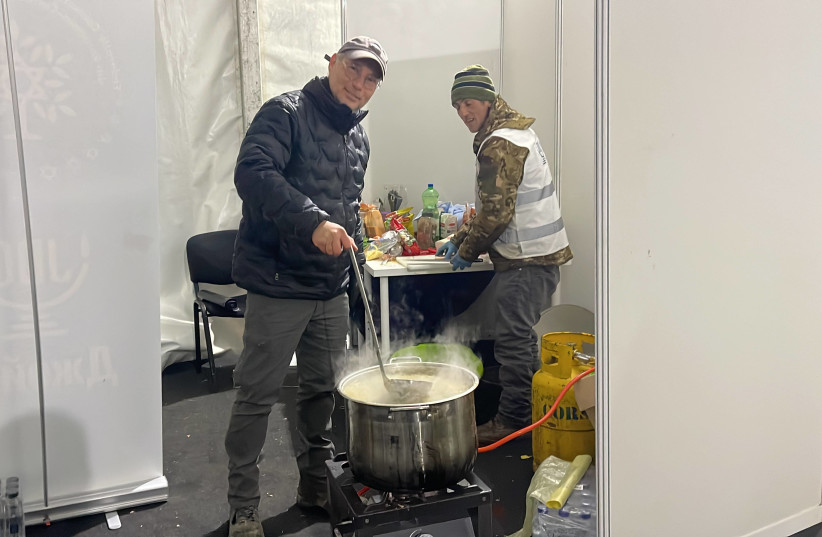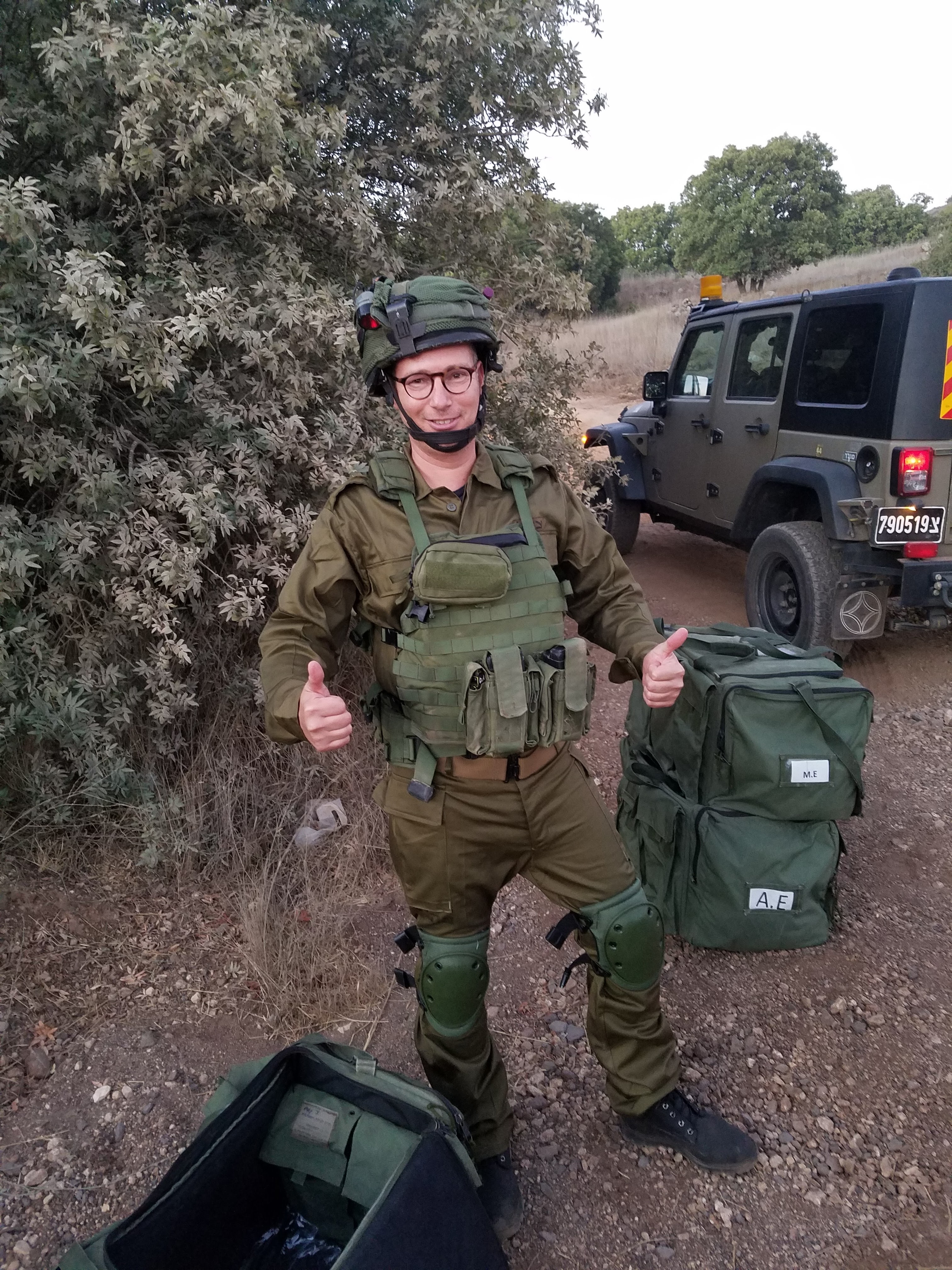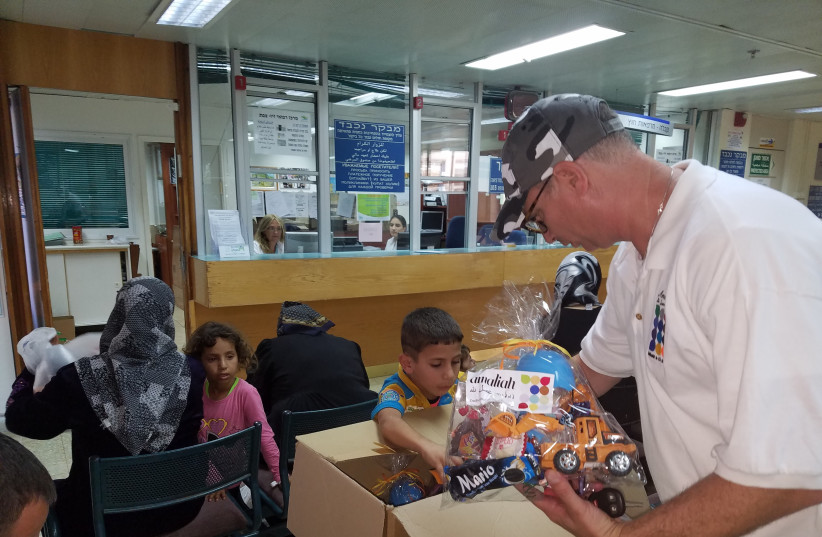When Moti Kahana describes the journey that brought him from being a successful entrepreneur to becoming a key figure in high-risk humanitarian missions, he points out two defining moments: a visit to Yad Vashem, The World Holocaust Remembrance Center in Jerusalem; and an encounter with a stranger in hurricane-ravaged New York.
According to Kahana, who over the course of the past 14 years has played an essential role in humanitarian missions in five wars, most recently as the CEO of his company GDC Inc., those two events changed the course of his life.
“I grew up without knowing much about my father’s side of the family, except for the fact that they were originally from Iasi, Romania,” he recalled. “One day, I visited Yad Vashem, and I found out that my relatives were not killed by the Nazis as I had always assumed, but rather by their Romanian neighbors with the support of the country’s government. That idea deeply shocked me.”
The Yad Vashem visit took place after Kahana had sold his company AutoMoti to the giant car rental company Hertz in 2009. In 2011, unrest began in Israel’s neighboring country Syria, which quickly turned into a civil war, with the regime, sitting in Damascus, massacring tens of thousands of its citizens. That left a deep impression on the Israeli-American businessman.
The next year, in 2012, Kahana found himself in New York in the aftermath of Hurricane Sandy,– which devastated the city, killing more than 40 people and leaving hundreds of thousands affected by flooding.
“At the time, I was running around Long Island and Queens donating gasoline, food, baby formula, and diapers,” Kahana said. “At some point, I ran into an African-American woman who was looking for water. I offered her some, and all of a sudden she gave me a big hug.”

The entrepreneur noted that this moment changed his perspective on life.
“The deep gratitude from a person who needed something as simple as water made me realize that I needed to get out and start helping people,” he said.
Kahana immediately began to look into the situation in Syria.
“The first thing I decided to do was to donate money to an NGO that was active there,” he explained. “However, I very quickly understood that the group was using my money to fly its staff first class. For that reason, I decided to start my own not-for-profit organization.”
In 2014, Kahana made headlines for the first time as he organized the rescue operation to get the last Jewish family of Aleppo out of Syria.
TWO YEARS later, he was instrumental in starting the initiative Buses of Angels, which enabled Syrian women and children to cross the border in secret to receive medical care in Israel.
“I remember very well the first time we went to pick up the Syrians from the border,” he said. “It was 2 a.m. and pitch dark. Both sides were terrified. The Israelis feared that there could be a suicide bomber, and the Syrians felt they were about to walk into the arms of the enemy.”
Kahana recalled how the border was opened and the group of Syrian mothers and children arrived, escorted by a guide.
“Everyone was completely quiet,” he said. “Then we started to climb the mountain, and all of a sudden I saw an Israeli soldier of the special forces set his gun aside to pick up a Syrian child whose mother could not manage to carry him. Very quickly, more and more soldiers did the same. It was an incredible moment.”

According to Kahana, that moment perfectly embodies the central message of his upcoming book Searching for God, which will be published in Hebrew by the Kinneret Zmora Publishing House in the forthcoming months. The rights to produce a movie have already been purchased by Oscar-nominated Israeli-American film director Lior Geller.
“I have witnessed many wars in the past few years, and what I have found out is that while you meet evil and many evil people, most people are good – and some become the angels that escort you along the way,” Kahana said. “For me, those young Israeli soldiers were angels, very much like the medical officer that we met later at the hospital who decided to cure a five-year-old Syrian girl for three months using the hospital’s budget – because he said he looked at her as if she was his own daughter.”
However, during his experience offering support to the Syrian people, Kahana also ran into several obstacles.
“The representative of another NGO slandered me with many people, claiming that I was lying about my involvement in Syria; and the Israeli authorities turned their back on me after I decided to go public with the initiative – despite the government itself having already done so,” he noted.
These problems also made it very difficult for Kahana to fundraise for his humanitarian efforts, which he was mainly supporting with his own money.
After these events, he stopped working on the Israeli-Syrian border and focused on supporting the Kurds’ fight against ISIS by providing humanitarian supplies.
“Alongside the logistical efforts, I also worked on what I would describe as humanitarian diplomacy,” Kahana said. “There might be many obstacles for Israelis to talk to Syrians or for Kurds to talk to Israelis, but everyone is willing to deal with a crazy Jew from America like me.”

Once again, though, he found himself facing some difficult challenges.
“The Kurds had defeated ISIS, but I was running out of money, and I realized that fundraising was not for me,” Kahana said, explaining that he had the idea of turning his experience into a business.
“The Kurds offered to provide me with Syrian oil to pay for the supplies they needed,” he recalled. “However, in order to sell the oil, I needed to receive a special license from the US government.”
Kahana did not receive the license. He thought his days on the frontline of high-risk humanitarian missions were over.
“I bought a farm in New Jersey, and I started focusing on that,” he said.
AND YET, the requests for help kept on coming. For that reason, Kahana decided to operate with his company GDC, which today offers humanitarian diplomacy, security, logistics, and consulting services to NGOs, governments, and companies.
“My company is like a war-zone Uber/UPS for people and goods,” he said. “I can be here on my farm directing an operation in the Middle East. We have 13 employees, including Stuart Seldowitz, who worked at the State Department during the Obama administration and is our humanitarian diplomacy senior consultant.”
The businessman explained that it is much cheaper for NGOs to outsource the logistics of their operations than to conduct them themselves. This allows more money to be spent on the actual cause they support.
Among others, Kahana was instrumental in helping the last Jewish family leave war-torn Yemen in 2020 and the last Jew leave Afghanistan in 2021. Kahana also assisted the British Royal Air Force and many other groups in rescuing people from Afghanistan after the Taliban retook control of the country – including a team of female soccer players in an initiative founded by celebrity Kim Kardashian.
When Russia invaded Ukraine, GDC’s help was once again sought by a Jewish organization.
“The American Joint Distribution Committee asked me to set up a refugee camp and a soup kitchen in Romania, near the border with Ukraine,” he said. “As I mentioned, my family is from Romania, and I loved the idea of helping out there. It turned out that we needed to set up the facility in the area of Suceava, and I happened to have an uncle there, Tuvia, who used to be a cook for the Israel Police. He immediately started to run the operation.”
Today, GDC manages some $20 million worth of humanitarian supplies every month, which gets distributed in Ukraine in cooperation with the Olena Zelenska Foundation, run by the country’s First Lady.
Most recently, Kahana has also been involved in the effort to bring home Israeli researcher Elizabeth Tsurkov, who was kidnapped by an Iran-backed militia in Iraq.
“People give me a lot of credit because I helped save the lives of many Jews in dangerous situations; but the truth is that I saved a total of maybe a few dozen Jews – 47 in Yemen, 12 in Syria, and one in Afghanistan,” Kahana said. “I have assisted a lot more Christians and Muslims, hundreds if not thousands of them,” he added.
“In the past 14 years, people have often asked why I do what I do,” he concluded. “I always respond that I have been searching for God, which became the title of my book. What I have found out is that God is good – what for some people is pursuing the divine, for others is finding the good in the world. And to me, that is what really matters.”
This article was written in cooperation with GDC Inc.
